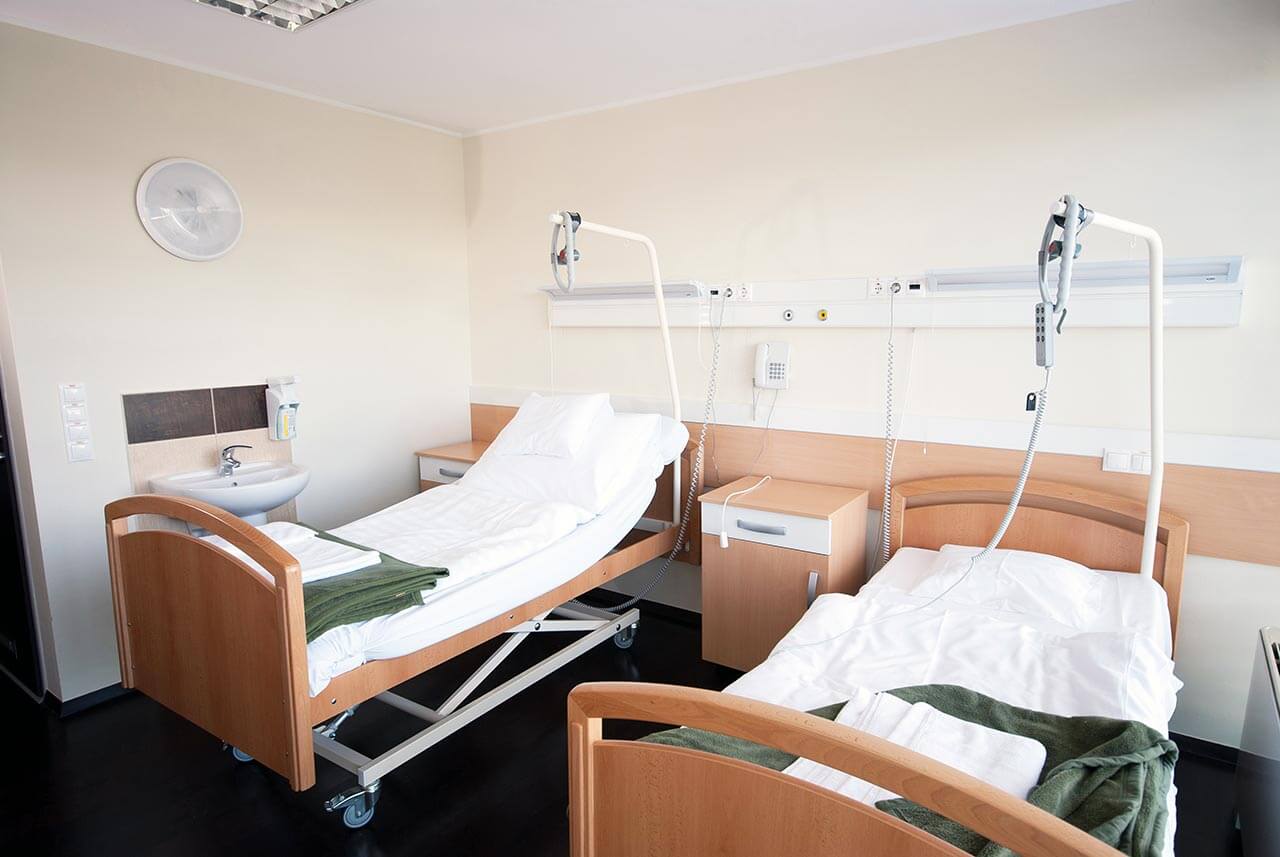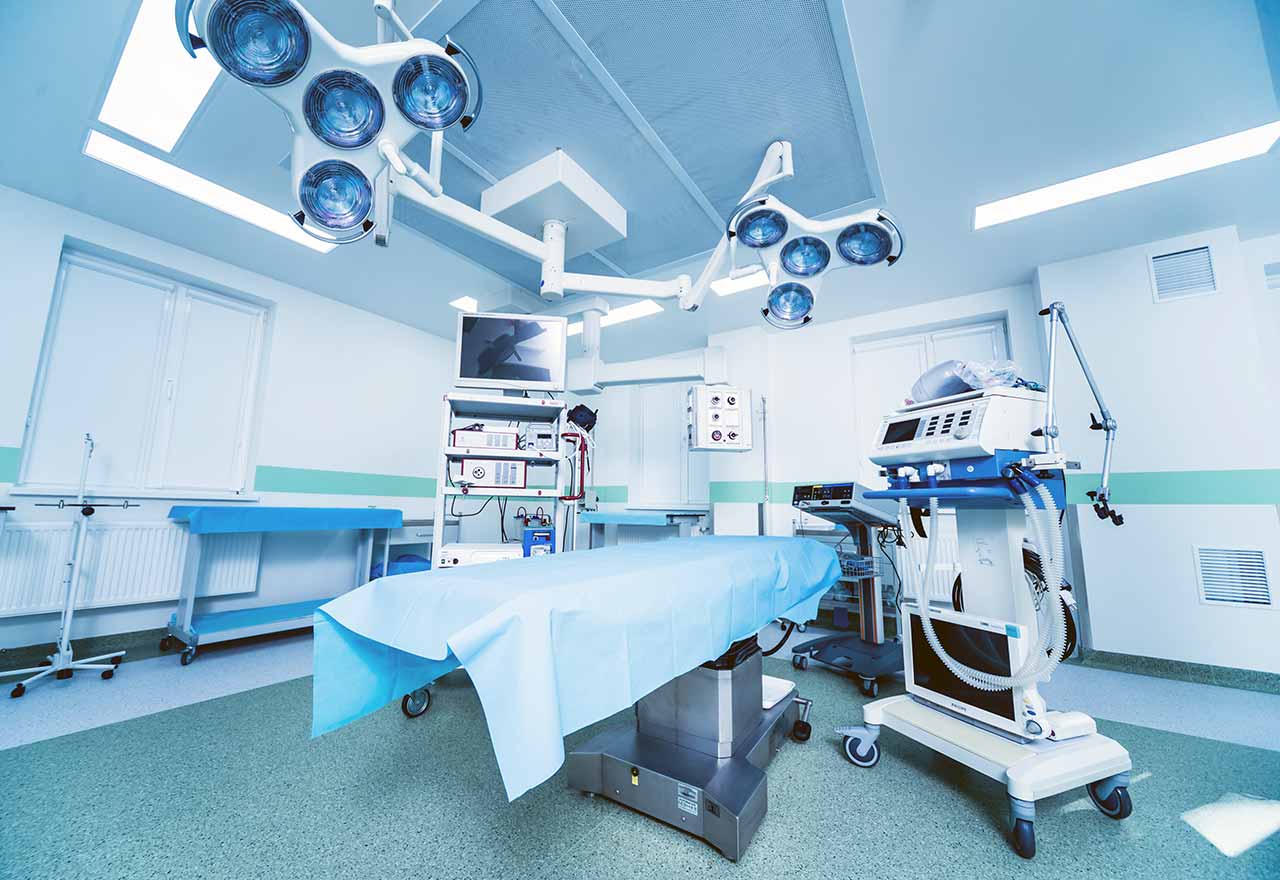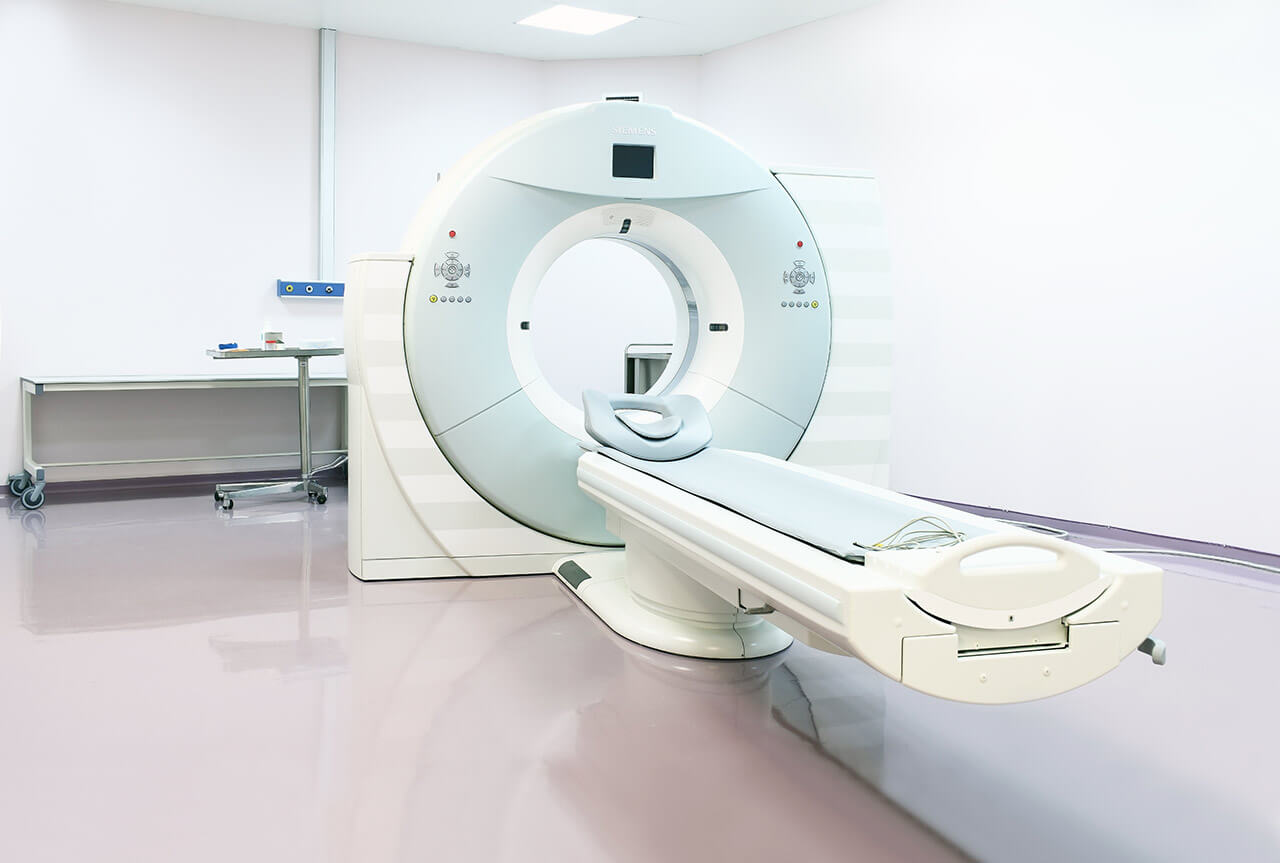
The program includes:
- Initial presentation in the clinic
- clinical history taking
- physical examination
- review of medical records
- laboratory tests:
- complete blood count
- general urine analysis
- biochemical analysis of blood
- indicators of inflammation (CRP, ESR)
- indicators of blood coagulation
- X-ray examination of the hip
- CT scan of the hip
- preoperative care
- endoprosthesis replacement
- symptomatic treatment
- control examinations
- physiotherapeutic procedures
- orthopedic appliances
- the cost of essential medicines and materials
- nursing services
- full hospital accommodation
- explanation of future recommendations
The program includes orthopedic rehabilitation:
- Primary presentation in the clinic
- medical history taking, including family history
- complex neurological and orthopedic examinations
- X-ray examination
- complex neurophysiological examinations
- individual rehabilitation program, which includes:
- Wii Fit training of balance
- neuropsychological therapy
- kinesiotherapy (physiotherapy)
- biocontrol with feedback
- healing deep muscle massage
- acupuncture in spasticity and pain syndromes
- occupational therapy
- psycho-educational classes
- individual physiotherapy
- microcurrent treatment
- fangotherapy / cryotherapy
- antispasmodic drug therapy
- hydrotherapy / massage therapy / reflexology
- training on special trainers
- and etc.
- nurses care
- stay in the hospital with full board
- symptomatic and drug therapy
How program is carried out
Preliminary preparation for surgery: quitting smoking and drinking alcohol 2 weeks before surgery; cancelling non-steroidal anti-inflammatory drugs (diclofenac, ibuprofen); cancelling anticoagulants (warfarin); normalization of body mass, if possible.
Preoperative examination, including consultation with an anesthesiologist and necessary related specialists. X-ray examination and MRI of the hip joint are performed. The examination takes 1-2 days.
Surgical hip endoprosthesis replacement. The operation is performed under general anesthesia and lasts for about 2 hours.
Postoperative care. During the first day after the intervention the patient stays in the intensive care unit, under round-the-clock medical supervision. After that, with a smooth course of the postoperative period, the patient is transferred to a regular ward and the drains are removed. The range of motion expands gradually, from light toes movements to walking. Walking with the use of walking aids is allowed in 3-5 days after the operation. Normal walking without the use of walking aids (crutches, cane) will become possible in 6-12 weeks.
Finally, the attending physician will evaluate the results of control examinations, schedule the date of discharge from the hospital and give you detailed recommendations for further follow-up and treatment.
Rehabilitation. The rehabilitation program begins after the transfer of the patient from the intensive care unit to a regular ward. It includes physical activity (from exercises in bed in the early days to exercises in the gym), physiotherapy, massage (including lymphatic drainage). After discharge from the hospital, the patient is transferred to a specialized rehabilitation clinic for 2 weeks, where he undergoes an advanced rehabilitation course.
Required documents
- X-ray examination of the hip joints
- MRI scan of the hip joints, if available
Service
You may also book:
 BookingHealth Price from:
BookingHealth Price from:
About the department
The Department of Orthopedics and Traumatology at the HELIOS University Hospital Wuppertal provides the full range of services for the diagnostics and treatment of musculoskeletal diseases. The department is certified as a supraregional Trauma Center, and therefore it admits patients with injuries of any severity and polytrauma. The priority fields of the department's clinical practice include joint replacement surgery, arthroscopic surgery, shoulder and elbow surgery, foot surgery, treatment of bone and soft tissue sarcomas, as well as treatment of infectious bone lesions (osteomyelitis), spinal injuries and diseases, including chronic back pain. The specialists of the medical facility prefer an individual approach to treatment and successfully apply it in their work. Each patient receives optimal treatment with the use of the very latest low-traumatic therapeutic techniques. During the diagnostics and treatment, doctors strictly observe hygiene and safety standards. The main goal of the medical team is to restore the musculoskeletal functions, which allow the patient to regain freedom of movement and lead a normal life. The department is headed by Prof. Dr. med. Erol Gercek.
One of the most demanded therapeutic procedures in the department is joint replacement surgery – an operation for partial or total joint replacement. The department specializes in knee, hip, shoulder, elbow and ankle joint replacement surgery. The main indication for replacing a joint with an artificial prosthesis is arthrosis (joint degeneration with its further destruction) with severe pain syndrome and limited mobility. The department's orthopedists perform joint replacement surgery using minimally invasive techniques with surgical access through several small incisions in the skin and soft tissues. When performing surgical interventions, doctors often use computer navigation systems in order to position the artificial joint as accurately as possible. An important role in the success of surgical treatment is played by the proper choice of endoprosthesis, and therefore the surgeon individually selects the optimal type of artificial joint (in some cases, the prosthesis is custom-made) prior to the intervention. The specialists of the medical facility work only with modern endoprostheses of world famous manufacturers distinguished by high reliability and durability – the service life of such an artificial joint is 15-20 years.
The department's orthopedists are proud of their vast experience in the treatment of bone and soft tissue sarcomas. The successful treatment of oncology requires an interdisciplinary approach, so patients receive care from the medical team, consisting of orthopedists, radiologists, oncologists, radiation therapists and nuclear medicine specialists. The treatment of soft tissue and bone sarcomas is based on malignancy resection, while special attention is paid to the complete removal of the tumor. In some cases, the patient undergoes chemotherapy and/or radiation therapy before surgery in order to reduce the tumor size. The specialists strive not only to save the patient from cancer, but also to preserve the function of the lower extremities and spine. Whenever required, when performing tumor removal surgery, doctors can simultaneously implant a prosthesis to reconstruct a limb or replenish the amount of bone tissue.
A special place in the work of the medical facility is occupied by the treatment of injuries and pathologies of the foot and ankle joint. Orthopedists use various conservative and surgical techniques for the treatment of degenerative tendon lesions of the foot, ankle joint arthrosis, ankle joint instability caused by ligament tear, toe deformities and malformations. The first-line treatment is always conservative therapy. The specialists resort to surgery only if sparing conservative methods do not give the desired result.
The department often admits patients with shoulder injuries and diseases such as rotator cuff tear, shoulder dislocation, shoulder instability and other pathologies. In such cases, pharmacotherapy and physiotherapy procedures are considered first of all. However, surgery is often required as well. As a progressive medical facility, the department offers a wide range of arthroscopic procedures – doctors rarely perform open shoulder surgery.
An integral part of the department's work is the treatment of musculoskeletal injuries. The area of responsibility of traumatologists of the medical facility includes the treatment of bone fractures, traumatic injuries of muscles, tendons and ligaments in all parts of the body. During long clinical activity, the department's doctors have developed effective regimens for the provision of medical care to patients with polytrauma and high-severity injuries.
The department's range of medical services includes:
- Orthopedics
- Knee, hip, shoulder, elbow and ankle joint replacement surgery (partial and total)
- Treatment of soft tissues and bone sarcomas
- Treatment of foot and ankle injuries and diseases
- Degenerative lesions of the foot tendons
- Ankle arthrosis
- Ankle instability due to ligament tears
- Toe deformities and malformations
- Treatment of shoulder and shoulder joint diseases
- Rotator cuff tear
- Shoulder dislocation
- Acute and chronic shoulder instability
- Shoulder arthrosis
- Treatment of elbow diseases
- Traumatic injuries
- Treatment of infectious bone diseases
- Osteomyelitis
- Treatment of spinal diseases and injuries
- Chronic back pain
- Spinal injuries
- Spinal disc herniation
- Traumatology
- Treatment of bone fractures
- Treatment of traumatic injuries of the muscles, tendons and ligaments of all parts of the body
- Treatment of spinal injuries
- Treatment of sports injuries
- Treatment of polytrauma and severe injuries
- Other medical services
Curriculum vitae
Prof. Dr. med. Erol Gercek is the Head of the Department of Orthopedics and Traumatology at the HELIOS University Hospital Wuppertal. The specialist received his education at the Faculty of Medicine at the University of Essen. This was followed by an internship in the Department of Cardiothoracic Surgery at the University Hospital Essen and in the Department of Traumatology at the University Hospital Mainz, after which he held the position of Assistant Physician in the Department of Surgery at the City Hospital in Ruesselsheim. In 2001, Dr. Erol Gercek again returned to the University Hospital Mainz. During this time, the specialist underwent his board certification in Orthopedics and Traumatology, and also received additional qualification in Special Traumatology. In 2005, Prof. Gercek became Senior Physician in the Department of Traumatology at the University Hospital Mainz. In 2010, the doctor became the Head of the Department of Orthopedics and Traumatology at the hospital in Koblenz.
Photo of the doctor: (c) Helios Universitätsklinikum Wuppertal
About hospital
According to the prestigious Focus magazine, the HELIOS University Hospital Wuppertal ranks among the top medical facilities in Germany!
The hospital rightfully enjoys the status of the maximum care medical facility and provides its high-quality services in all modern fields of medicine. The hospital operates on the basis of the Witten/Herdecke University, which was opened in 1982 and today is considered one of the best in Germany. Thus, many head physicians of the medical complex are in charge of the corresponding department at the university, which contributes to the close intertwining of research activities and clinical practice. The hospital has long traditions and its own values – the main goal of doctors is to provide comprehensive medical care focused not only on curing the disease, but also on the patient's personal needs.
The hospital has 1,000 beds. The doctors of the medical facility admit more than 50,000 inpatients annually. In addition, more than 100,000 outpatients undergo diagnostic and therapeutic procedures. Such high attendance rates speak for themselves and are undeniable proof of the high-quality medical service of the European level. The medical staff of the hospital has more than 2,500 employees, whose main task is to restore the patient's health and provide him with a decent quality of life.
The hospital has more than 26 specialized departments, as well as many narrowly focused centers and institutes dealing with the treatment of patients suffering from a particular group of diseases: Breast Center, Cancer Center, Cardiology Center, Trauma Center, Spine Center and others. The primary clinical focus of the medical center is cancer treatment.
For more than 25 years, the hospital has been running a special quality management system for medical care, which regulates the aspects of work of the medical staff, compliance with hygiene and safety standards during diagnostics and treatment. Consequently, patients can be sure that their health is in the safe hands of true professionals who work in accordance with the latest medical standards.
Special attention should be paid to the honors of the hospital for excellent patient care. The medical complex has quality certificates from the German Cancer Society (DKG), the German Trauma Society (DGU), the German Cardiac Society (DGK), the German Stroke Society (DSG) and other professional German societies.
Photo: (с) depositphotos
Accommodation in hospital
Patients rooms
The patients of the HELIOS University Hospital Wuppertal live in comfortable single, double, triple and quadruple rooms. Each patient room has an ensuite bathroom with shower and toilet. The standard room furnishings include a comfortable automatically adjustable bed, a bedside table, a wardrobe, a TV and a telephone. The hospital has Wi-Fi (free). For maximum patient comfort, there is a nurse call device on the bedside table. This device allows the patient to control the TV, radio, turn on or off the lights, and adjust the position of the bed.
The patients of the hospital are also offered accommodation in enhanced-comfort rooms. These rooms additionally provide a safe and a free minibar with soft drinks. The enhanced-comfort rooms also have a spacious bathroom with hairdryer, bathrobe, towels and toiletries.
Meals and Menus
The patients of the hospital are offered three meals a day: breakfast, lunch and dinner. The menu offers a variety of delicious dishes to suit all tastes, including dietary and vegetarian options.
The hospital also has a bistro where one can taste delicious hot dishes, cold snacks, desserts, as well as a cup of tea, coffee or refreshments.
The patients staying in enhanced-comfort rooms are offered a separate menu that includes a wider and more refined range of dishes. In addition, fresh fruit, tea, coffee and desserts are delivered to the patient room every day, if desired.
Further details
Standard rooms include:
Religion
The religious services are available upon request.
Accompanying person
During an inpatient program, your accompanying person can stay with you in the patient room or in the hotel of your choice.
Hotel
During an outpatient program, you can stay in the hotel of your choice. Our managers will help you choose the most suitable options.




